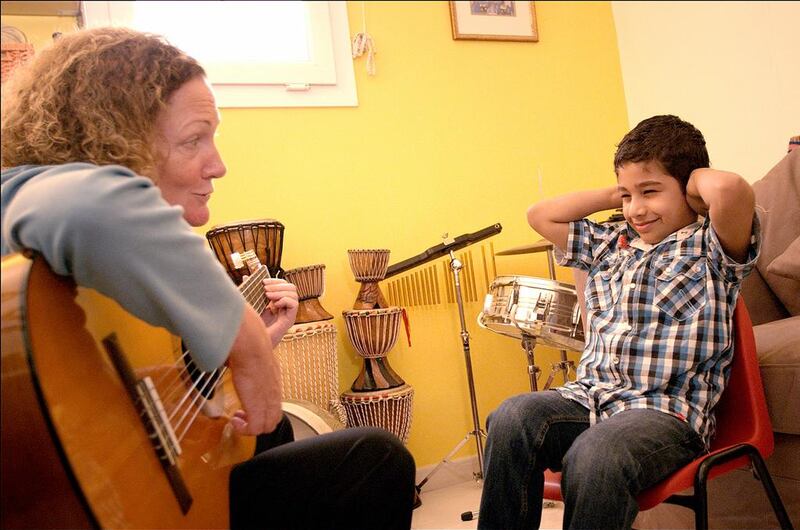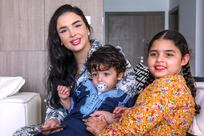When the Emirati filmmaker Amal Al Agroobi began exploring the effect of music therapy on children with autism for a documentary last year, she ended up unearthing startling facts about the obstacles that are faced by their families.
Her film The Brain That Sings has been nominated in the Emirati category of the Muhr Awards at the Dubai International Film Festival, which begins tomorrow.
It follows two Emirati boys with autism, Mohammed Al Tamimi, 19, and Khalifa Al Ali, 6, as they receive music therapy over three months. It’s also a visual essay on the decisions, circumstances and social exclusion that their parents face raising them.
“I started out to make a film about music therapy and whether it helps these children or not,” says Al Agroobi, who was first approached by Khalifa’s mother to make the documentary. “What it has turned out to be is completely different. Music therapy is a part of it but it was a way to reveal how the families deal with autism as a whole.”
Khalifa’s mother, Fauzia, got involved out of her “own frustrations”.
“When it comes to finding a school for him, the financial constraints, the therapies, the rejection, it is all a struggle,” says Fauzia.
“Khalifa was diagnosed with autism at the age of 4 and was receiving behavioural therapy at home. His disruptive behaviour had hindered opportunities in mainstream education.” When her husband died last year, Khalifa could not continue with regular therapy because of financial constraints. “People do not understand his behaviour and do not even attempt to see that he is different. But every day he shows me how amazing he is. If people could just step back and give him a chance without being judgemental.”
It’s an issue that is high on the Government’s agenda, with increasing pressure on organisations that discriminate. Yet, Al Agroobi says, it’s a sensitive topic to discuss openly, especially in Arab society, and that piqued her interest.
The filmmaker, who has a background in neuroscience, already tackled a taboo subject with her documentary Half Emirati (2012), which was based on mixed marriages. So she decided to make this film to initiate another important discussion. She raised initial funding of US$13,000 (Dh47,749) through the crowdfunding website Aflamnah and was further supported by private investors, twofour54, Abu Dhabi Music and Arts Foundation and Mena CineFinance.
There are no official figures on autism in the UAE because many cases go undiagnosed or are not registered with educational institutions. In the US, one in 88 children is affected by autism spectrum disorders; treatment costs more than $60,000 a year.
Al Agroobi wanted to couple these questions with details on music therapy after hearing about its benefits at a talk.
“We have never seen a film about music therapy and autism in the Middle East,” says Al Agroobi.
“I thought that would be interesting. It is always difficult with documentaries because someone is opening up their life for public scrutiny. At times, I think their parents were hesitant about what they wanted to show and talk about. But they finally agreed to put forth their stories to help others deal with autism in the UAE.”
The going is tough: one family withdrew because they worried that their child would be ostracised.
But Marion Tennant, a music therapist in Dubai, tailored the programme for the boys who continued. Mohammed’s father, Saleh Al Tamimi, who discusses his son’s medical history of epilepsy and expensive treatments in the film, wanted therapy to address Mohammed’s violent outbursts. As for Khalifa, music helped him cope with the death of his father.
Tala Badri, a musician and the founder of the Centre for Musical Arts in Dubai, says music allows children with autism to express themselves better.
“In general, music helps develop the brain,” says Badri, who has successfully applied it to her daughter, who suffers from Asperger’s syndrome.
“Children with autism find it hard to organise themselves; music provides the focus they need. And from a social perspective, they start interacting with peers and others without feeling threatened.”
Al Agroobi says that the frequent lessons, over three months, made the boys confident: “The therapist allowed them to make their own music first. The she flipped it and gave them pieces to follow. Mohammed began listening to instructions.”
Al Agroobi also includes interviews with experts and autism centres for a broader perspective on the disorder. “I think it is important to give audiences an understanding of what autism is and share a bit about the family’s life. That runs parallel to the influence of music therapy in the film. Their education and financial support for autistic children are addressed as well.”
The four-month-long filming schedule was fraught with unexpected roadblocks.
“Collecting information was shockingly difficult,” Al Agroobi confesses.
“Disability policies haven’t been established as effectively here as in the western countries. I feel a lot of the entities have a leeway in providing access to families. Many centres are reluctant to share and do not even allow parents in to monitor the progress of their children. In fact, I completed an interview at a centre and was then asked to omit the footage.”
For Fauzia, the documentary is a platform that raises concerns.
“It was an emotional experience,” she says. “I talk a lot about the situation and the challenges I have to deal with. People need to know what it is like. And Khalifa loved the music lessons. He began expressing himself and talking more. I could see him emoting, something very rare for children with autism.”
Al Agroobi says she does not expect immediate acceptance by the public but does advocate the need for awareness.
“We aren’t saying that we should put a label on an autistic child and stick him in the middle of the mall for people to accept him. I do not expect that kind of reaction. I respect that the local community will be sensitive to the topic and hope they will be more aware.”
She also adds that she wants parents of children with autism “to connect”.
“I do not know how this will be received, but I am noticing some changes since I began promoting the film – families are reaching out to others in the same situation.”
• The Brain That Sings will open at the cinema at Mall of the Emirates on Saturday at 6pm, with another showing on Monday at 9.45pm. Ticket information can be found at www.diff.ae
[ aahmed@thenational.ae ]










